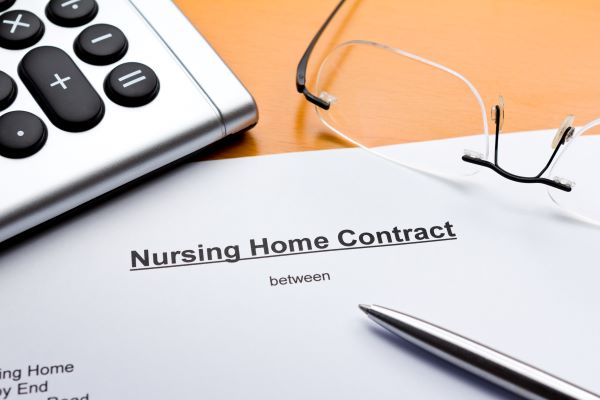Many people assume they will never need long-term care. However, nearly 70 percent of adults age 65 and over will require such services at some point in their later years. Long-term care insurance (LTCI) can help older adults afford the long-term care services they may one day need.

Nursing Home Contracts Require Careful Examination
Envision your loved one is no longer being able to care for themselves and now need to be cared for in a nursing home facility. You are stressed and anxious. The nursing home puts a twenty-page, single-spaced contract in front of you. You wish you could flip straight to the last page and sign then and there, just to get it over with.
Do not do this. You could be agreeing to pay, out of your own pocket, many thousands of dollars for your mother’s care.
Try to get your mother admitted and then, before you sign the contract, bring it to us for our review and guidance. Once your mother has moved in, she can’t be evicted just because you want to negotiate the contract.
But if that is not feasible, then sit down and take a few deep breaths. Read the contract carefully. Make a list of questions and ask a facility representative to explain. Ideally, that person would sit with you as you go through the document. Don’t sign until you understand.
Here is what to watch out for.
You should not use your own money to pay
* Do not sign the contract if it requires you to obligate yourself to pay with your own money. Carefully scrutinize any language referring to you as the “responsible party” or “resident representative” or “agent.”
The suspect buzz-words are “co-signor,” “guarantor,” “personally guarantee,” “personally liable,” “private-pay guarantor,” “surety,” “individual capacity,” or any such language. Words like these obligate you, personally, to pay if your mother doesn’t have the money. Don’t sign even if there are no buzzwords, but the language looks something like this: “If the resident does not or cannot pay, I will pay the amount owed for residency charges, services, equipment, supplies, medication, and other charges.”
Please understand that it is legal for the facility to require you, if you hold financial power of attorney or are guardian, to pay nursing-home bills from your mother’s money and assets. It is legal to require you to spend her money on her care and not for any other purpose. It is not legal to condition your mother’s admission on your agreeing to pay her bills with your own money, which is what the above buzz-words mean in plain English. The nursing home can ask you to agree – and if they ask, refuse – but you cannot be forced to agree to pay with your own money.
If your mother lacks the money, the next step is to apply for Medicaid assistance, not to go digging into your pocket.
Sometimes the contract is confusing. For instance, one nursing-home agreement says that the representative “personally guarantees continuity of payment.” This alarming language is properly followed by an italicized statement that the representative is “not required to pay for Resident’s care from his/her own personal funds.” The agreement proceeds, though, to use the phrase “personally guarantee” in other contexts. Ambiguity like this is why we recommend that you first bring the agreement to us. We can ensure, on your behalf, that the facility clarifies such language and does not misapply it.
Everyone in need has the right to apply for Medicaid
* The nursing-home contract must not require your mother to waive – give up – her right to seek government assistance like Medicare or Medicaid, nor can it ask her or you to sign any statement that she is ineligible for those benefits.
* If your mother has no money to pay for care, a Medicaid application will be required. The contract may seek your permission to apply for Medicaid for you. You have the right to decline that option and, instead, seek legal counsel to help you apply. We have seen some facilities mishandle Medicaid applications, which wound up being denied when they should not have been.
In any case, though, whoever files for Medicaid, you must cooperate by immediately providing all records necessary for that application.
If your mother is eligible for Medicaid, Medicaid pays
* If your mother does get Medicaid, the nursing home must not require an additional payment over and above that designated by the Medicaid scheme in your State.
* The nursing home must not demand that your mother receive additional services not covered by Medicaid and then, if your mother declines those services, evict her. It should ask, in advance, whether those services are desired at a specified additional cost.
* The nursing home must not require additional donations to a charity as a condition of admittance.
Do not agree to arbitration
* The contract may seek your consent to arbitration. If you agree, you will be giving up your right to a jury trial if a dispute arises. The rules are in flux at the moment, but, generally, you should decline such a provision.
Please contact us at 914-498-8709 and schedule a free consultation to discuss your legal matters.